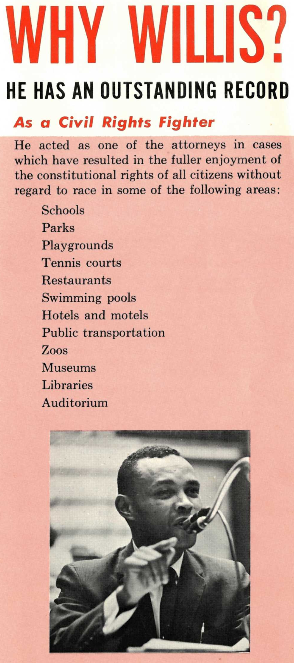
“Why Willis?”. See the full brochure on DIG Memphis.
The 1967 mayoral election consisted of two rounds of voting: a first round with seven candidates and a runoff round between the two top vote getters from the first round.
Ahead of the sanitation workers’ strike, the mayoral election polarized the city along racial lines. Henry Loeb, the eventual winner, won with a majority of the white vote. Incumbent Mayor William Ingram, Loeb’s main competitor, had hoped to win with a majority of the black vote. To help Ingram win, Ingram’s black political allies, such as O.Z. Evers, accused state legislator A.C. Willis Jr., the only black candidate in the race, of being in the pay of Loeb. A pamphlet that Evers’ Memphis Unity League distributed depicted Willis with cartoonish features taking $50 bills for “making lotsa civil rights speeches” and chuckling that “they (black voters) sho is falling for it.” In part because of these attacks, Willis eventually came in fourth in the first round of the election with a little more than 12 percent of the vote.
During the campaign, Loeb ran on a conservative platform touting law and order; it was a position that played well with voters due to fears about racial tensions and potential violence. In one instance in late July 1967, businesses at three different locations throughout the city suffered minor fire damage because someone tossed Molotov cocktails into them. The incident sparked rumors of a possible race riot. In response, the Governor ordered 3,000 members of the Tennessee National Guard into the city to maintain order. In part because of these fears of violence, Loeb received the most votes in the first round of voting in October and easily cruised to victory over Ingram in the November runoff.
Loeb’s victory revealed a city divided between a black minority and a white majority. A conservative businessman, Loeb had made opposition to integration a part of his campaign during a previous mayoral race in 1959, and it seems that black voters didn’t forget that during the 1967 election. Either way, Loeb’s campaign made the calculation that it would be possible to win with just the white vote. As one campaign adviser named Bob Smith wrote to Loeb about a runoff with Ingram, “It wouldn’t hurt us to get some negro votes, but you can win without them.” Smith’s only fear was if someone besides the unpopular Ingram made the runoff, such as a candidate who could win the black vote plus some white votes. Even then, a unified “negro bloc vote would be the only thing that could beat us.” In the end, Loeb beat Ingram by over 7 percent in the run off with a majority of the white support while Ingram received the support of nearly all black voters who showed up to the polls.
The other candidates in the first round of voting were Shelby County Sheriff William Morris, Public Works Commissioner Pete Sisson, Public Service Commissioner Hunter Lane Jr, and Mrs. O. E. Oxley.
Kellett, Robert. “No Violence Is Predicted, But Guard Moves Into City.” Commercial Appeal (Memphis, TN), Jul. 29, 1967.
Unknown. “Last Guard Units Depart Memphis.” Commercial Appeal (Memphis, TN), Jul. 31, 1967.
Street, William B. “Ingram, Loeb Move Into Runoff.” Commercial Appeal (Memphis, TN), Oct. 6, 1967.
Street, William B. “Loeb Is Winner In Mayor’s Race.” Commercial Appeal (Memphis, TN), Nov. 3, 1967.
Bob Smith to Henry Loeb, Saturday Morning. Box 20, Folder 6. Papers of Henry Loeb III. History Department,Memphis Public Libraries, Memphis, TN.
Dowdy, Wayne. Crusades for Freedom: Memphis and the Political Transformation of the American South. Jackson: University Press of Mississippi, 2010.
A Vote For Willis, Will Be A Vote For Loeb. Civil Rights Collection, DIG Memphis.
Henry Loeb for Mayor. The M Files, DIG Memphis.
Why Willis? Civil Rights Collection, DIG Memphis.






